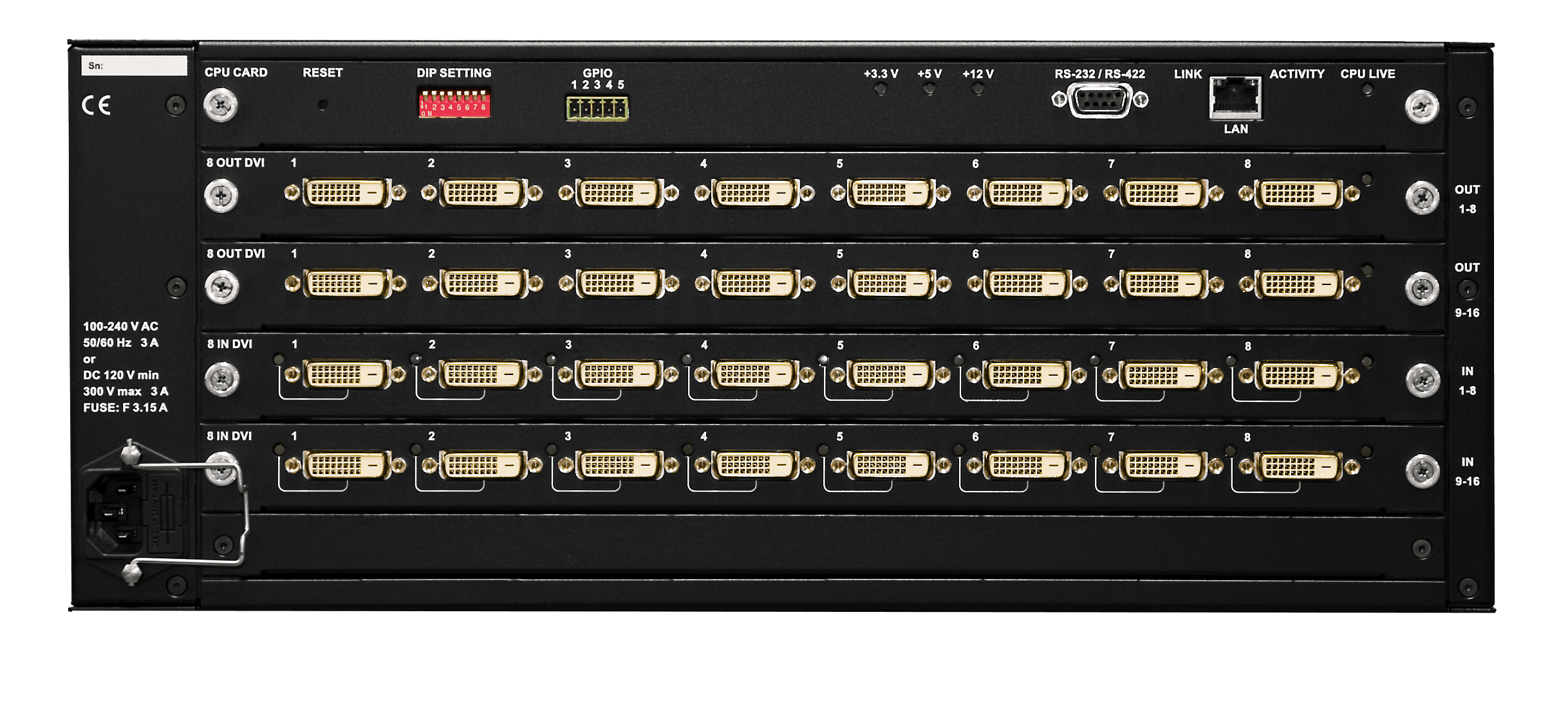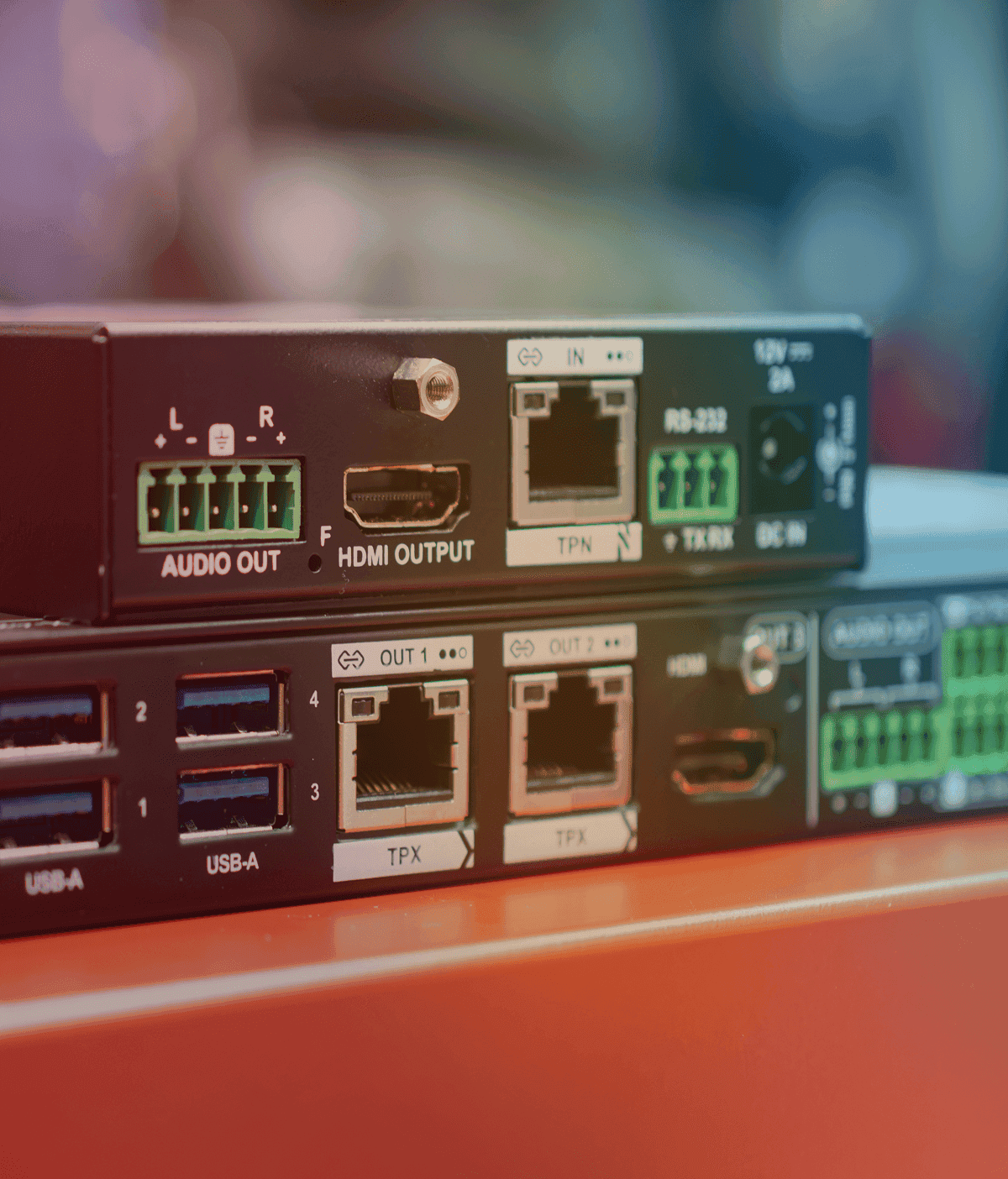
MX Modular Matrix Series
The MX series offers high-performance, modular DVI and HDMI switchers in frame sizes from 9x9 to 80x80, enabling fully customizable signal routing solutions.
Redefining Professional AV Switching
The MX Series from Lightware sets a new benchmark in high-performance matrix switching. With its modular design, flexible configurations, and robust performance, it addresses the challenges of modern AV installations.
The built‑in sophisticated software and hardware features make these routers the most flexible integrated solution and have proven to be a sturdy, reliable gear chosen by AV professionals for applications in practically every segment of the industry. From corporate boardrooms to large-scale event spaces, the MX Series ensures simple signal distribution and management.

Key Features
4K UHD & 3D Support
The MX Series supports the highest 4K UHD, 2560x1600 and 1920x1080@120Hz resolutions, standard HDMI 3D formats and all HDMI 1.3 resolutions, operating without signal latency.
Cross Compatibility
The MX series has non‑blocking topology: any input can be tied to any one or more outputs without limitations. One source can be tied to multiple destinations at the same time. Crosspoint switching is done instantly without frame delay.
HDCP Compatibility
MX frames and I/O boards support HDCP-encrypted sources and displays. Their non-blocking architecture ensures seamless integration of HDCP and non-HDCP components within the same chassis, simplifying complex AV setups.
Frame Detector and Input Signal Analysis
Exclusive to Lightware matrices, these tools identify video formats and diagnose issues. The signal analyzer provides detailed video and audio data, while the Frame Detector displays parameters through an intuitive interface.
Advanced EDID Management
Lightware technology supports 100+ user EDID files and various factory settings. The free Device Controller software lets users create or modify EDID files (.bin, .dat, .edid) for Lightware and third-party devices.
Pixel Accurate Reclocking
Pixel Accurate Reclocking removes noise, skew, and jitter from signals, compensates for cable imperfections, and regenerates stable, sharp DVI/HDMI output with accurate timings.
Built-in Cable Compensation
MX modular matrices feature manual or automatic adaptive modes that extend input cable lengths up to 60 meters for 1080p, WUXGA, and 2K resolutions at 24bpp, using high-quality 22AWG DVI or HDMI cables. This eliminates the need for extra cable extenders.

Advanced Control Options
MX frames feature advanced control options for system control, setup, maintenance, and troubleshooting. A rugged Ethercon connector provides a reliable connection to the LAN, allowing multiple TCP/IP and WEB controls simultaneously. An RS-232 connector supports 3rd party control systems. The touch-panel controls offer customization and simplicity in system operation. The front panel includes a mini USB connector for easy access in rack applications. The free Lightware Device Controller software enables quick matrix configuration and easy EDID setup with the built-in Advanced EDID Editor.
Reliability & Redundancy
At Lightware, we focus on designing and developing reliable products. The MX-FR33R, MX-FR65R, and MX-FR80R frames feature hot-swappable N+1 redundant power supplies for mission-critical operations where redundancy and high reliability are essential. If one power supply fails, the remaining units continue to operate, ensuring seamless AV system performance. Our power supplies have a 1,000,000 hours MTBF and are loaded to a maximum of 60%. They accept all international AC line voltages from 100 to 240V with 50 to 60 Hz frequency via a standard IEC connector. The MX series offers dual power inlets for extra security and safety.


I/O Boards: Non-blocking Architecture
The Hybrid Modular Architecture offers various input and output interface boards that can be freely mixed in the same frame without limitation, even boards with different interface types (DVI, HDMI, fiber optical, or CATx twisted pair). A wide range of compatible Lightware extender devices is available to link with the installed input and output boards.
The Perfect Choice for

RS-232 Over Fiber and TPS
This control option enables remote control of endpoint devices (e.g., sources and displays) through a single fiber or twisted pair cable. The central control system sends and receives commands with RS-232 control capability via the same cable carrying video and audio, eliminating the need for extra cabling. The matrix acts as a communication hub, allowing communication with all endpoint devices through a single LAN or RS-232 connection when connected to optical or TPS transmitters and receivers.
Watch Webinars
Explore our training materials focused on the features and benefits of advanced connectivity technology in various Lightware devices, and discover how to leverage them to elevate your AV operations to the next level.














